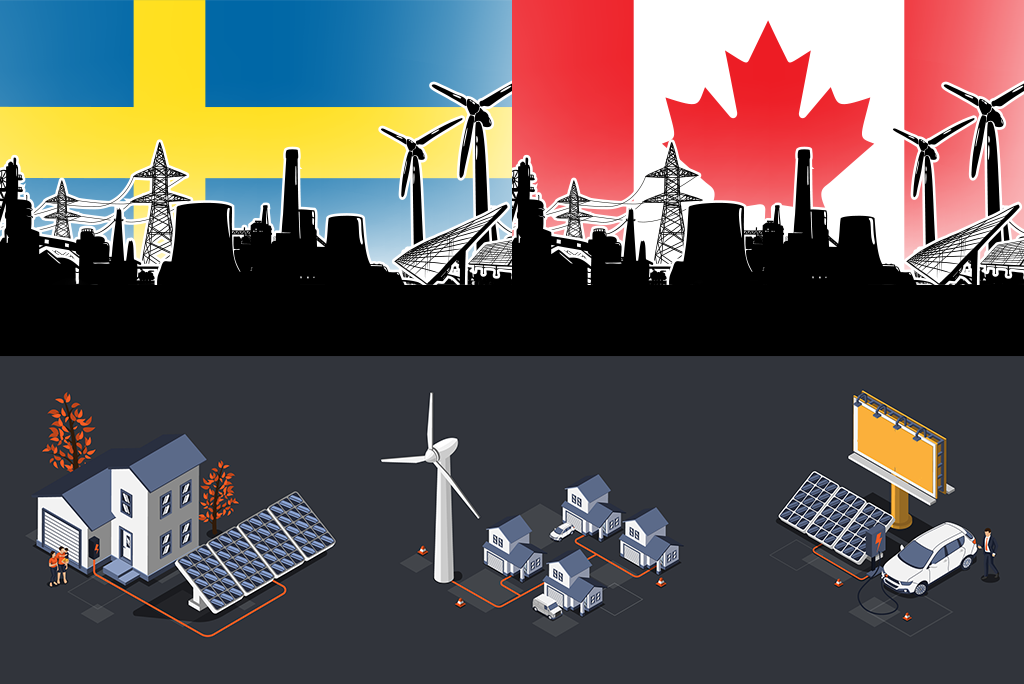
The smart grid is a digitized electrical grid that allows for two-way communication between the utility and the consumer. While the smart grid can provide a greener, cost-effective solution to humanity’s energy needs, implementing it won’t be easy. It will take both time and money to replace the decades-old electric grids that currently supply the world’s energy. To ease the transition, a number of smart grid pilot programs are unfolding across the world. As discussed in a previous post, some national and local governments are already spearheading smart grid rollouts.
Sweden Turns Apartment Buildings into Hyper Local Power Stations
With bountiful waterways and forests, Sweden has an abundance of biomass and hydropower that is driving a renewable energy boom. The country gets 54% of its energy from renewables, and it is leading other nations in reaching the European Union goal of generating a third of its energy from renewables by 2030.
For over half a century, Sweden has relied on local district heating plants, which redirect excess heat from local power plants to homes. In the past, the by-products of power plants, industrial processes, and waste-to-energy plants powered these local district heating plants. Today, these systems are increasingly relying on biomass as the fuel source. There are now roughly 500 district heating systems in Sweden’s villages and cities that generate more than 75% of household heating.
In the city of Ludvika, an ambitious project is providing insight into how smart grid technology may someday deliver “hyper local” power. A cluster of “prosumer buildings”—about 50 apartments across three buildings—are producing energy to meet the needs of 77% of residents. The buildings were retrofitted with solar panels, thermal energy storage, and heat pump systems, all of which are connected to a micro energy grid that charges electric vehicles (EV) overnight.
Electric Vehicle Smart-Charging Pilot Program Launches in Canada
Smart Grid Nova Scotia is one of a handful of Canadian pilot programs that is testing smart grid technology in local communities. The program has launched an electric vehicle smart-charging pilot program in 100 households in Nova Scotia. It aims to show how distributed energy can benefit both utilities and customers.
Here’s how it works: Homeowners pay CAD$350 in exchange for the program’s ChargePoint Home Flex EV smart charging system. They can choose to participate in a two-year pilot in which the program manages the EV charging and guarantees vehicles will be fully charged every morning. Participating homeowners receive $500, which means they will earn a total of CAD$150 in addition to the EV charger. In return, Nova Scotia Power will gain insight into how to manage and integrate renewable energy in the grid.
The program will also install solar panels and battery storage at four commercial areas, along with as many as 150 energy storage batteries in businesses and homes, 20 vehicle-to-grid charging points, and a rooftop solar garden in the city of Amherst. The idea is to offset consumption demand from EV charging and reduce energy costs.
“Our hope is that all of these technologies will help support our transition to cleaner energy,” Sanjeev Pushkarna, senior program manager of Smart Grid Nova Scotia, told Electric Autonomy Canada. “We’ve got some ambitious goals and have made a lot of progress to date. We have plans to be upwards of 60 percent non-emitting by 2022, but we don’t want to stop there. These technologies will help us to continue to integrate additional renewable energy into the system.”
The program will collect important data on technologies such as vehicle-to-grid, and is expected to demonstrate the benefits of load management methods, battery storage and renewables to regulators.
Understand the Smart Grid
Do you want to get a better understanding of the smart grid? Check out Modernizing the Smart Grid, a four-course online learning program from IEEE.
One of the biggest frontiers in electrical engineering today is the development and implementation of smart grid technology. Fueled by the global demand for greener technologies and alternative fuels, environmentally-friendly smart grid technology can stimulate stagnated economies. Furthermore, it has the potential to change the way power is delivered to electricity consumers around the world.
Modernizing the Smart Grid, now available on the IEEE Learning Network, is designed to get you and your team up to speed quickly on the latest smart grid technologies.
Interested in bulk discounts for your organization? Contact us today, and we’ll put you in touch with an IEEE Account Specialist.
Resources
Jarratt, Emma. (7 October 2020). Utility will pay customers to install electric vehicle smart chargers as it moves to incorporate visibility, more capacity and lower costs into the province’s grid. Electric Autonomy.
Kretchmer, Harry. (21 September 2020). Transforming homes into power stations – how Sweden is disrupting energy production. World Economic Forum.


No comments yet.